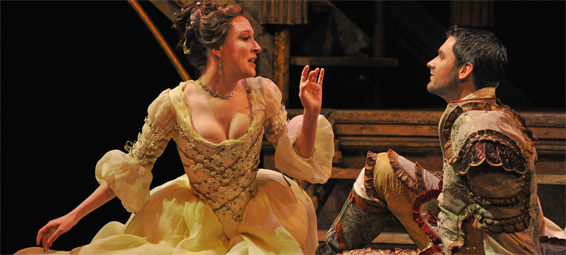Baroque opera is an acquired taste, and Fort Worth Opera’s production of Handel’s Julius Caesar, which opened Saturday at Bass Performance Hall, gives plenty of incentives for opera buffs to learn to love this special corner of the operatic repertoire.
For the modern audience member, the most obvious attribute of Julius Caesar (and virtually all other baroque operas) is its stately pace. Even a drama packed with murder, revenge, war, and love moves patiently, with the events themselves taking up about ten per cent of the space (in the arias) and reflections on the events, usually with multiple repetition of text and music, filling up the rest of the time. Ideally, this shows off the composer’s ability to spin beautiful, expressive melodies, and the singers’ ability to sing beautifully.
Complicating the task of making the piece comprehensible to modern audiences is the fact that several of the most significant male roles, including Caesar himself, were written in the alto range. Back in Handel’s day, these roles were sung by castrati (imported from Italy for Handel’s London productions). Nowadays, those roles are taken either by women in drag or countertenors, who are male singers who particularly cultivate that range. Fort Worth Opera went the countertenor route for Caesar, Sextus, and Ptolemy, with a female mezzo-soprano in the male comprimario role of Nirenus.
The task of turning Handel’s dignified procession of recitatives and arias into compelling drama falls most heavily on the stage director, who must remain faithful to the spirit of another time while engaging an audience accustomed to quick action. Director avid Gately accomplished this by expanding, in several directions, on hints in the text. This was most obvious in presenting Cleopatra’s brother (and political rival) Ptolemy as a raging homo-villain, complete with an entourage of hunky guards. Gately wasn’t above introducing a touch of comedy or acting out of the violence of the text; he even played up the symbolism and other-worldly aspects of the drama by introducing the physical (albeit silent) presence of the ghost of the murdered Pompey and, in the final ensemble, two characters who had died in the course of the action.
In spite of all those countertenors, it was two females playing actual females—soprano Ava Pine as Cleopatra and contralto Meredith Arwady—who won the most cheers. Pine, who began her international career largely in the Dallas area, was a natural Cleopatra, both vocally and dramatically, with the stamina and flexible technique this role requires. Arwady, who won plaudits as the innkeeper in Dallas Opera’s production of Boris Godunov just a few weeks ago, made a spectacular success of the mournful Cornelia’s string of tragic arias. She’s clearly an operatic force to be reckoned with. Among all those countertenors, Michael Maniaci in the role of Sextus proved the most adept at attaching a heroic male role to a high vocal range. Randall Scotting in the title role and Jose Alvarez as Ptolemy had their moments, though one frequently yearned for a more solid vocal presence. Such is the dilemma of the countertenor.
Daniel Beckwith conducted from the harpsichord, staying faithful to the light, transparent textures of the baroque, and generally opting for quicker, momentous tempos. The sets, originally designed by Ming Cho Lee for Lyric Opera of Kansas City, featured a symmetrical arrangement of stair-cases and platforms. Robert Perdziola’s costumes were, appropriately, a sort of twenty-first adaptation of an eighteenth-century view of ancient attire, with an emphasis on the eighteenth century. The era in which Handel created Julius Caesar was rife with the sort of intrigue, instability, and politics colored by personal lusts and desires portrayed in the opera. Politics, symbolism, and personality intersect in this work as in few other operas, and Fort Worth Opera’s production provided a sound vehicle for capturing that heady mixture.
Cleopatra (Ava Pine) disguises herself in order to seduce Caesar (Randall Scotting). (Photo courtesy: Ellen Appel)





